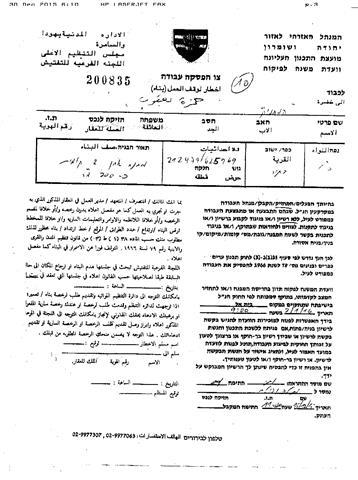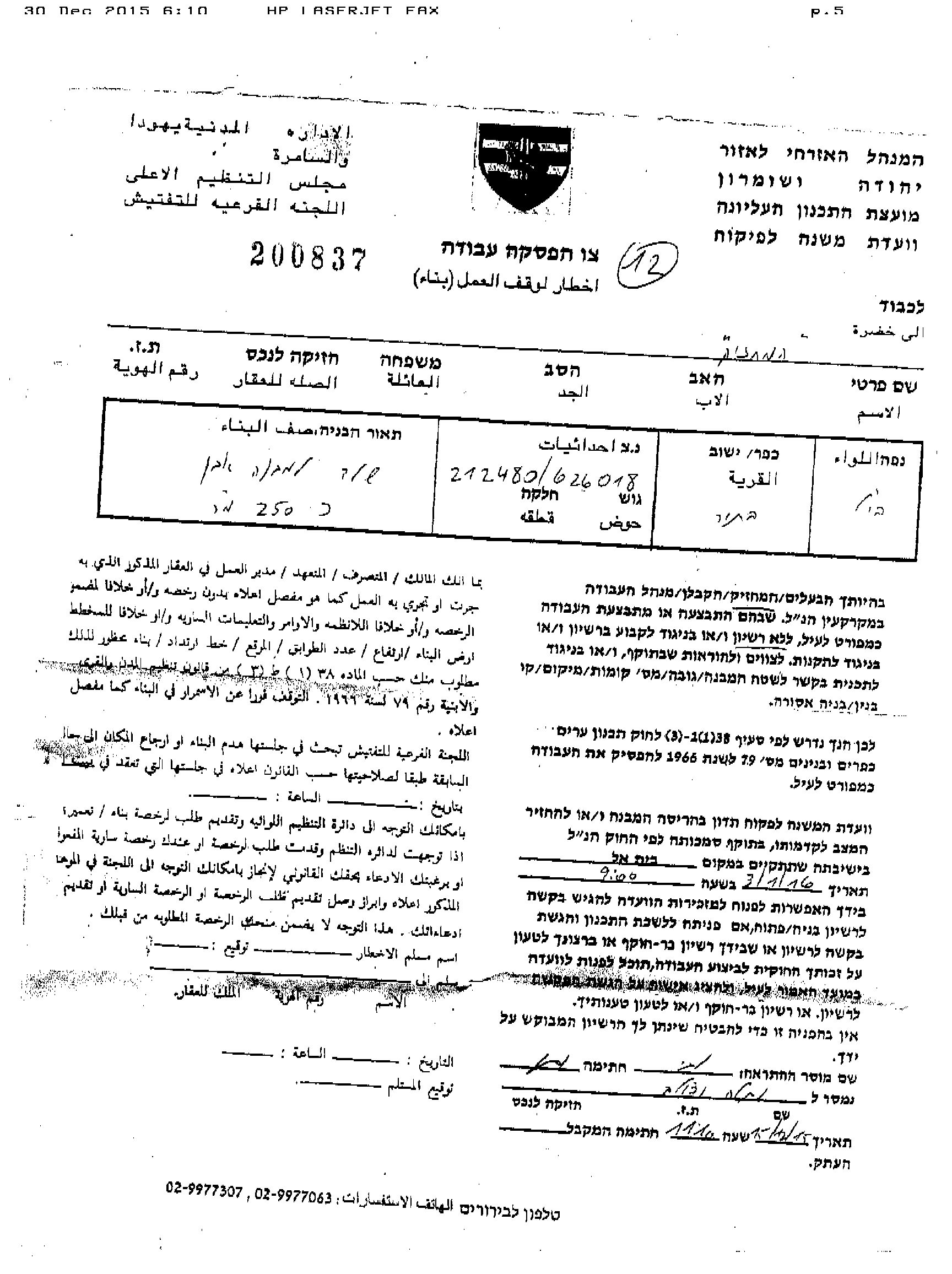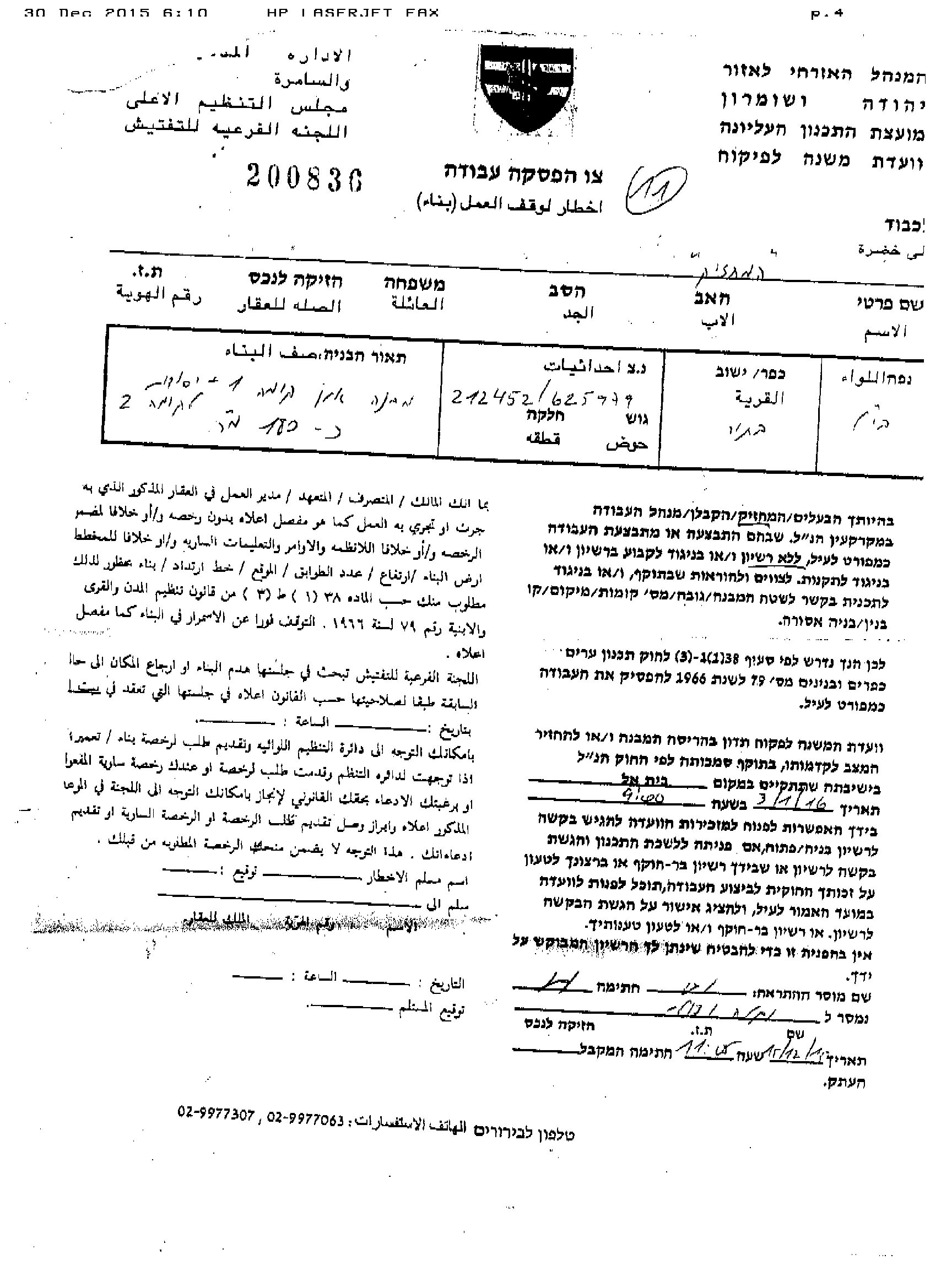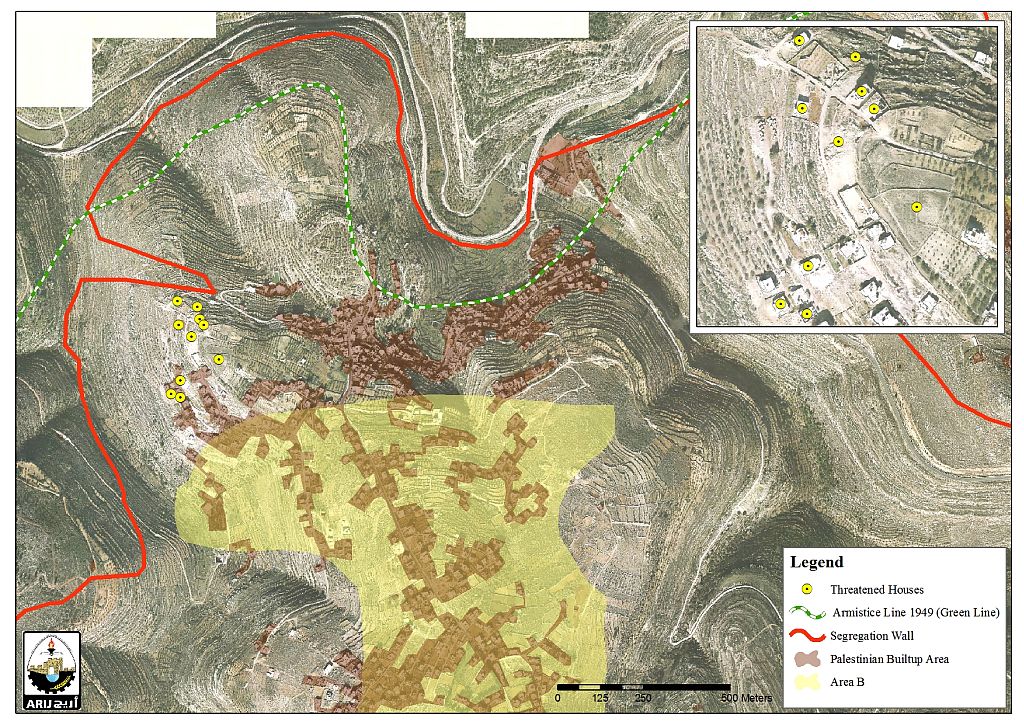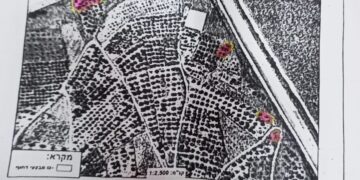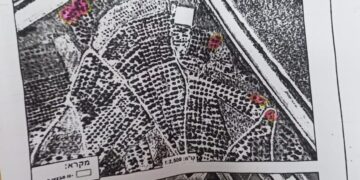On the 29th of December 2015, the Israeli Civil Administration served halt-of-construction notices to 12 Palestinian families in the village of Battir west of Bethlehem city, allegedly for building without license, in a part of the village known as “C”, a designation from the OSLO II Interim Agreement of 1995. In this area, Israel retains full military and administrative control. The orders were issued on the 15th of December 2015, but were served to Palestinians in Battir village two weeks later. Owners of some of the targeted homes/structures were identified as: Fadi Khalil Al Qaisi, Fadi Jameel Abdullah, Ibrahim Ali An Najjar, Yaser Mahmoud Qattush, Hazem Ahmad Abdel Wahab, Hazem Adnan Ash Sholi, Muhammad Hussein Ash Shami and Hamza Yacob Hamamda.
The served orders state that “ Since you are the owner / liable / contractor / Work Manager / of the aforementioned property, which is undergoing construction (as detailed in the halt-of-construction order) without a license and / or violating the content of the license and / or built contrary to the regulations and orders and instructions in force and / or violating the master plan of the area/ height/ number of floors/ site/ prohibited construction, you are required under Article 38 (1) (3) of Planning of Towns, Villages and Buildings law, No. 79 of the year 1966 to immediately halt construction in the aforementioned property.”
The inspection subcommittee affiliated to the Israeli Civil administration will discuss in its session that will be held on the 3rd of January 2016 in Beit El the demolition of the targeted homes/structures or the restoration of the place to its previous status according to the powers given to it with regard to the above-mentioned law. Table 1 gives details of the military orders that were served to residents of Battir village:-
|
Table 1: Targeted Palestinian homes/structures in Battir Village , Bethlehem Governorate |
||||
|
No. |
Military Order No. |
X |
Y |
Area of Structure ( sqm²) |
|
1 |
212591 |
626078 |
|
|
|
2 |
212511 |
626145 |
260
|
|
|
3 |
212474 |
626179 |
160
|
|
|
4 |
212535 |
626196 |
100
|
|
|
5 |
212547 |
626178 |
230
|
|
|
6 |
212471 |
626248 |
200
|
|
|
7 |
212528 |
626231 |
380
|
|
|
212479 |
625969 |
200 |
||
|
9 |
212452 |
625979 |
180
|
|
|
10 |
212480 |
626018 |
250
|
|
|
Source: Battir Village Council, 2015 |
||||
Photo 1-2: Copes of some of the military orders served to Battir families
The targeted homes/structures are located west of Battir village, some hundred meters away from the 1949 Armistice Line (Green Line) and the planned path of the Israeli Segregation Wall. See Map 1
Map 1: The threatened Palestinian Homes / Structures in Battir village, west of Bethlehem city
As mentioned earlier in the report, the land area classified as 'C' in the occupied West Bank falls under the full Israeli control – security and administrative-; and in order for a Palestinian to build in that area, he must apply for a permit from the Israeli Civil Administration to be able to be; otherwise, his building/home/structure will become liable for demolition.
This year (2015) there has been a noticeable increase in demolitions carried out in the occupied West Bank and demolition threats served to Palestinians. There were 264 demolitions between January and December, and were mostly carried out in area C, in addition to more than 500 demolition threats that were served to Palestinians in the oPt. The bitter reality in the occupied West Bank is that Israeli settlements continue to grow in an unprecedented level; at the same time, demolition of Palestinian homes and structures are always on the rise. For more information, read the following: The Palestinian Dilemma of Building in Area C
A final point,
The Israeli Occupation Authorities usually justify the demolishing of Palestinian homes in the occupied West Bank mostly for lacking valid building permits from the Israeli designated authorities or under security needs; and the result is that Palestinian families at most cases (when demolition orders are executed), are displaced and left homeless, or have to go through the long and tedious process of issuing a building license for their targeted home/structure. On the other hand, thousands of settlement units are given the Green Light by the various Israeli authorities (such as the Ministry of Housing and construction, the Israeli civil Administration, and the Israeli Interior ministry) even though such building in the settlements blatantly violates all international law and the human conventions.
Israel's home demolition policy is a grave breach of the Geneva Conventions of 1949 and the demolitions of Palestinian homes should be treated as War Crimes. In addition, since the demolitions come within the context of Israel's continued construction in Israeli settlements and the building of the Segregation Wall in the Occupied Palestinian Territory (OPT), they stand as violation to the International Court of Justice's ruling on July, 9, 2004 which condemned the Wall and called for its dismantlement. Following is a synopsis of articles within these covenants, conventions and laws that address the issue of house demolitions and forced evictions under these articles:
International Covenant on Economic, Social and Cultural Rights
Article 11 (1): 'The States Parties to the present Covenant recognize the right of everyone to an adequate standard of living for himself and his family, including adequate food, clothing and housing, and to the continuous improvement of living conditions'.
International Convention on the Elimination of All Forms of Racial Discrimination (1965)
Article 5: 'States' Parties undertake to prohibit and eliminate racial discrimination in all of its forms and to guarantee the right of everyone, without distinction as to race, color, or national or ethnic origin, to equality before the law, notably in the enjoyment of the following rights: … (e) in particular … (iii) the right to housing'.
Universal declaration of human rights, Article 17:
1. 'Everyone has the right to own property alone as well as in association with others.'
2. 'No one shall be arbitrarily deprived of his property.'
Article 25:
1. 'Everyone has the right to a standard of living adequate for the health and well-being of himself and of his family, including food, clothing, housing and medical care and necessary social services, and the right to security in the event of unemployment, sickness, disability, widowhood, old age or other lack of livelihood in circumstances beyond his control.'
The Fourth Geneva Convention
Article 53: 'Any destruction by the Occupying Power of real or personal property belonging individually or collectively to private persons, or to the State, or to other public authorities, or to social or cooperative organizations, is prohibited, except where such destruction is rendered absolutely necessary by military operations.'
Article 47: 'Protected persons who are in occupied territory shall not be deprived, in any case or in any manner whatsoever, of the benefits of the present Convention by any change introduced as the result of the occupation of a territory, into the institutions or government of the said territory, nor by any agreement concluded between the authorities of the occupied territory and the Occupying power, nor by any annexation by the latter of the whole or part of the occupied territory.'
Article 147: 'Grave breaches to which the preceding Article relates shall be those involving any of the following acts … extensive destruction and appropriation of property, not justified by military necessity and carried out unlawfully and wantonly.'
Hague Regulations 1907
Section II Article 23: 'it is especially forbidden- to destroy or seize the enemy's property, unless such destruction or seizure be imperatively demanded by the necessities of war.'
Section III Article 46: 'Family honor and rights, the lives of persons, and private property, as well as religious convictions and practice must be respected. Private property cannot be confiscated.'
Agenda 21 (UNCED, 1992)
Chapter 7.6: 'Access to safe and healthy shelter is essential to a person's physical, psychological, social and economic well-being and should be a fundamental part of national and international action. The right to adequate housing as a basic human right is enshrined in the Universal Declaration of Human Rights and the International Covenant on Economic, Social and Cultural Rights. Despite this, it is estimated that at the present time, at least one billion people do not have access to safe and healthy shelter and that if appropriate action is not taken, this number will increase dramatically by the end of the century and beyond.'
'People should be protected by law against unfair eviction from their homes or land'.
Prepared by:
The Applied Research Institute – Jerusalem


